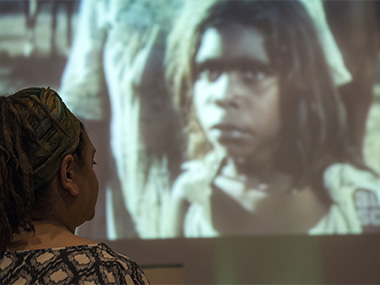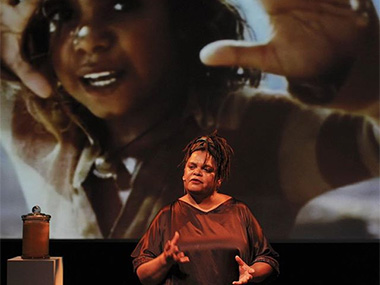ONE BILLION BEATS

Romaine Moreton faces her past - an unknown Aboriginal girl captured in all her uncertainty in an unidentified film
Posted by Jeremy Eccles | 01.03.16
Dates:
26.02.16
: 05.03.16
Location: Campbelltown Art Centre
Romaine Moreton is a poet – her mastery of the English language (rather than her tribal Quandamooka and Bundjalung languages) is unquestioned. And she has a PhD to prove it. And it's her poetic way of thinking that gets her through 'One Billion Beats' engagingly and movingly rather than via any logical impetus.
The show – named for the numbers of Australia's pre-colonial generations, and co-written with the experienced playwright, Alana Valentine – is hailed as “privileging an Indigenous perspective on cultural representation in film and beyond”. Twenty films are listed in the program (and two were denied her) though they're never identified during proceedings and are rarely even mentioned by Moreton as she gives us autobiographical snatches from her life, rouses us with poetry, rap and song, and localises the show to Campbelltown with opening and closing images of a bull (post-1788) drawn by Dharawal artists in charcoal on a local cave wall. This she tells us is Aboriginal magic comparable to the spell cast across Australia by the White magic of film.
Sadly, the Dharawal magic now requires a cage around it to preserve it from the graffiti of unappreciative Campbelltowners – descendants of the people, perhaps, who committed the adjacent Appin Massacre. Not that Moreton harps on massacres – apart from the memorable line, “Your massacres are my genocide” - accompanied by a repeated loop from a film in which a vengeful white farmer shoots an Aborigine time and time and time again.
But what was his motive?
The problem with the history of film in Australia is that, until the 1970s, so little of it was actually Australian. Much was scripted and funded out of the US and UK with Australia an exotic setting interchangeable with Africa, but cheaper to film in. And you could always black up a white actor – an outrage that continued right through to Baz Luhrmann's 'Australia' when Aboriginal actors didn't look quite dark enough! So, it's all a bit like the Intervention – white notions of Indigeneity being tramped out into the bush and imposed upon the natives without any thought of asking them how they might be portrayed.
Even our own Charles Chauvel – famous for 'Jedda', which, of course, gets a showing here – attempted something fairly awful called 'Uncivilised' in 1936 – a white tribal leader and a white love interest, shot in an invented 'village' on Palm Island – naff-looking 'corroborees' in the background.
It's only really when we come to 'We of the Never Never' on Moreton's list in 1982 that Angela Punch-McGregor's Mrs Anaeas Gunn is allowed sympathetic words about the Indigenous cause, even though they attract the mockery of her white ringers. But then Moreton has left off her list a whole heap of more empathetic films such as Walkabout, The Chant of Jimmie Blacksmith, Rabbit Proof Fence and, above all, Backroads – where, in 1977, Phil Noyce handed over the Indigenous motivating to the almost Black Panther activist, Gary Foley.
And she only takes us one film into the new black – films actually made by Aborigines. Her finale involves the wonderful scene from Samson and Delilah where Delilah has taken her self-destructive, petrol-sniffing beau to an outstation beyond the reach of society or petrol, and she bathes him tenderly in a cattle trough. But it must be very hard for non-afficionados of the film to be able to place the politics of that scene – self-reliance, an outstation at a time when the NT government wanted to shove everyone into a limited number of townships, and the arrival of director/cinematographer Warwick Thornton on the scene to show us a tough solution to an intransigent problem. Magic indeed.
Meanwhile, problems crop up at the beginning of Romaine Moreton's personal life – her childhood friendship with the only other little girl around on a remote farm, shattered when she discovers she's just “a Black bastard” in the big house. The showers installed at her Bodalla school, but only for Aborigines to use; so a good intention becomes an act of shaming for her. Even her first literary success – an essay on her ambition to be a bird, and fly like an eagle – becomes an embarrassment when the headmaster reads it out at assembly.
Later, her quiet power in such matters as 'identifying' as Aboriginal - “I don't need to – I am”, and the extraordinary feat of turning her back to the audience, projecting an image of Truganini on her back and reciting the challenging poem - 'I shall surprise you by my will' – achieves what Campbelltown Art Centre's Artistic Director Michael Dagostino justly describes as “speaking directly to the history of resilience of Aboriginal people and to the strength and beauty of Indigenous futurity”.
Let's hope that future is a whole lot easier than a past where Romaine Moreton can recall all those educational efforts to “rescue” her from “savagery” when the disparate range of aunties and grannies with whom she lived as a child already had houses filled with encyclopaedias. For we have at least advanced well beyond films like 'Uncivilised'!
URL: http://c-a-c.com.au/onebillionbeats/
Share this:
»  del.icio.us
»
del.icio.us
»  Digg it
»
Digg it
»  reddit
»
reddit
»  Google
»
Google
»  StumbleUpon
»
StumbleUpon
»  Technorati
»
Technorati
»  Facebook
Facebook
Contact Details

Romaine Moreton in full flow as an unknown Aboriginal girl stops the cattle stampede in 'Australia - The Movie' behind her
Further Research
News Tags: Australian film | Campbelltown Arts Centre | Dharawal people | Jeremy Eccles | Romaine Moreton
News Categories: Blog | Event | News | Other Event
Exhibition Archive
- 10.10.17 | TARNANTHI 2017
- 11.08.17 | Natsiaas 2017
- 20.07.17 | APY ART DOMINATES THE WYNNE
- 17.07.17 | Anangu Artist Wins $100,000 Prize
- 14.07.17 | The End of AAMU
- 11.07.17 | ART ACROSS THE COUNTRY
- 11.07.17 | TARNANTHI IN OCTOBER
- 05.07.17 | TJUNGUṈUTJA - from having come together
- 13.06.17 | Ghost-Nets Straddle the World
- 07.06.17 | Grayson Perry Going Indigenous?
- 05.06.17 | Barks Bigger than Ben Hur
- 27.05.17 | NGA QUINQUENNIAL 2017
- 21.05.17 | Blak Douglas Finds Home at the NGA
- 21.05.17 | BRIAN ROBINSON WINS HAZELHURST WOP
- 18.05.17 | PARRTJIMA 2.0
Advertising

